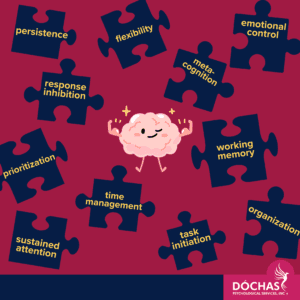Executive functions are like an orchestra conductor, coordinating various cognitive abilities to create a harmonious symphony of actions and thoughts. Weaknesses in executive functioning can present significant challenges in your daily life.
It’s Irene on the blog this week – I want to explain what executive functions are. Executive functions work together to regulate our behaviours. Our frontal lobes, specifically the prefrontal cortex, are primarily responsible for executive function. Executive functions develop overtime as the brain develops, but they can also be enhanced through intentional practice and skill building.
What Are Our Executive Functions?
There is some disagreement about the exact number of executive functions, but for the purpose of this article we will work with the definitions offered by expert Peg Dawson, who identified 11 skills that comprise executive function. We all have strengths and weaknesses in the following areas:
- Response inhibition – the capacity to think before you act. This is the capacity to resist an urge and consider consequences or impact of a behaviour and withhold inappropriate responses.
- Working memory – the ability to hold and manipulate information in memory while performing complex tasks. Working memory applies past experiences to the current situation to solve problems.
- Emotional control – the ability to manage emotions to achieve a goal.
- Sustained attention – the capacity to keep paying attention to a task or situation in spite or boredom, fatigue or distraction.
- Task initiation – the ability to begin projects without procrastination.
- Planning/prioritization – the ability to make decisions about what tasks should be focused on and create a roadmap to reach a goal. This includes the ability to identify a goal and break it down into manageable steps.
- Organization – the ability to create and maintain systems to keep track of information and materials.
- Time management – the ability to estimate how much time you have, how to allocate time, and how to stay within time limits and deadlines.
- Goal-directed persistence – the capacity to have a goal and to follow through with it.
- Flexibility – The ability to revise plans in the face of setbacks/mistakes and to be adaptable to changing conditions. The ability to switch between tasks and revise as needed.
- Metacognition – the ability to self-monitor and evaluate your own performance, and to make adjustments to improve.
I encourage you to reflect on the executive functions you excel at and the ones you could work on to improve your personal and professional life.
Struggling with your Executive Functioning?
We all have unique strengths and weaknesses when it comes to executive functioning, but some people struggle more than others. For example, people with ADHD (Attention-Deficit Hyperactivity Disorder) or ASD (Autism Spectrum Disorder) often struggle with executive functioning challenges. It can be helpful to learn more about executive functioning, and if needed, seek therapy or your physician to address deficits or challenges. A therapist can help identify areas for growth and help plan strategies to compensate, or build skills if executive functioning problems are impacting your work or relationships. I invite you to reach out at 780-446-0300 or info@dochaspsych.com for extra support.
For more tips to improve your executive functioning, I recommend the book “The Smart but Scattered Guide to Success” by Peg Dawson.
About Dóchas Psychological
Dóchas Psychological Services is a well-established and trusted therapy clinic located in Spruce Grove, Alberta. At Dóchas we value the idea that everyone deserves a safe space. Through connection and education, our team works hard to build a trustworthy relationship with each of our clients. It is our goal to create a community for our clients to feel like they belong.
Disclaimer
Information provided through Dóchas Psychological Services blogs or vlogs is meant for educational purposes only. They are NOT medical or mental health advice. You can read more about our disclaimer here.










